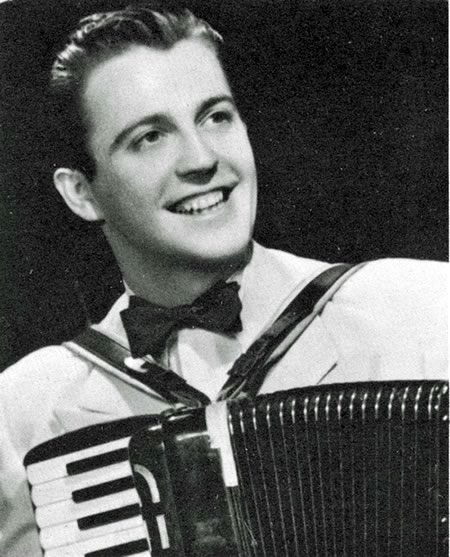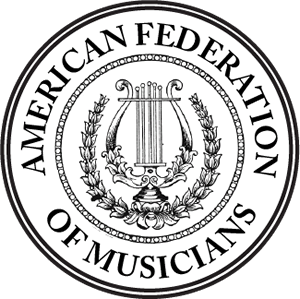Gordie Kenneth Fleming
1931 – 2002
Accordionist, pianist, composer; b. Winnipeg, Manitoba, 3 August 1931. Gordie Kenneth Fleming began his musical journey in the early stages of his life. At the age of five, he appeared as an act at the Beacon Vaudeville Theatre in Winnipeg, and continued to do the circuit from 1936 to 1941. Performances included, the Orpheum, Walker, Odeon and Playhouse Theatres. From 1941 to 1945, Gordie played many Army camp tours in Western Canada, as well as numerous radio shows on private and CBC coast-to-coast network presentations. From 1945-1949 he performed in Winnipeg nightclubs such as the Don Carlos Casino, The Highwayman, The Flame and the Copacabana, and accompanied Hank Snow for several months at Patterson’s Barn.
From the time of his early days playing music, Gordie was featured playing jazz, folk, classical and standard music in concert and on hundreds of radio and television programs. Gordie’s reputation as a versatile musician had developed immensely by this time. However, there was one thing that stood out, and that was his extraordinary talent as a jazz accordionist.
In 1949, Gordie’s accordion was destroyed in a fire. With the $500 insurance money, he discovered that he would have enough to purchase a new accordion and move to Montréal with drummer Billy Graham, a fellow Winnipeg native who introduced Gordie to the music of Charlie Parker. Gordie fell in love with the music scene in Montreal and decided he would turn his trip into a permanent move. Before long, Gordie was performing at top nightclubs including the Bellevue Casino, The Esquire, The Downbeat, The El Morocco and the Penthouse. Throughout the next few years, Gordie also played numerous out-of-town engagements throughout Quebec and the Eastern US and toured France in 1953.
Gordie appeared with the jazz-poll winning group and with the Canadian All Stars in concerts with Charlie Parker in 1953. He won the Canadian Jazz Poll four years in a row (1952-55) and placed second (to Art van Damme) in the Metronome US Jazz Poll in 1955. Gordie, with the Canadian All Stars recorded a compilation in 1954 for US label “Discovery”. A label that specialized in featuring the best in modern jazz from around the world (George Shearing, Dizzy Gillespie, John Dankworth). “Gordie’s sound, execution and especially conception, mark him as the top modern jazzman on his instrument.” remarked Ira Gitler in the liner notes of the compilation. The other All Stars were Al Baculis (arrangements, clarinet), Yvan Landry (piano, vibes), Hal Gaylor (bass) and fellow Winnipegger Billy Graham (drums).
In 1954, Gordie was awarded the top prize on the CBC’s “Opportunity Knocks” contest, and later went on to perform on the Aurthur Godfrey Show. Throughout the 1970’s, Gordie’s work in the Montreal radio and television scene continued to grow. He was often heard on CKAC, CBC (Funny You Should Say That) and Radio-Canada (Les Joyeux Troubadours). Gordie recorded jazz for the CBC and Radio Canada, with trumpeter Herbie Spanier, Tony Romandini, Buck Lacombe, on programmes such as Jazz en Liberte, CBC Showcase, Jazz Set and Jazz Canadiana. As well, Gordie wrote, arranged, composed and conducted the scores for several films, including Where Eagles Fly, 60 Cycles, Catuor (NFB) and various television series (Story of Dorian Gray, Family Court, Larry Solway) for Columbia/Screen Gems throughout the 1960’s and 1970’s.
Gordie accompanied many top recording stars such as Edith Piaf, Felix Leclerc, Tino Rossi, Ginette Reno, Pauline Julien and Willie Lamothe, with whom he had a daily radio show in the ’60s on CKVL. He performed mainly on organ with the Johnny Holmes Orchestra and as a guest with the Montreal Symphony. As an orchestra leader, Gordie performed for heads of state (Pierre Elliot Trudeau and Fidel Castro). He played several Army base tours overseas and at numerous society functions, weddings and bar mitzvahs: he was especially popular with the Jewish community as he knew many of the horas. London and RCA labels recorded various pieces of Gordie’s accordion music, waltzes, musette pieces, traditional jigs and reels. With a parallel career in folk music, Gordie performed and recorded with Ti-Jean Carignan, The McGarrigles, Cat Stephens and Alan Mills with whom he made several Folkways recordings. He had an interest in “world music” and enjoyed the challenge of performing everything from Greek Bouzouki, Yiddish Horas, Gypsy waltzes, to Irish, Scottish and Quebecois jigs and reels. As a result, Gordie published a fake book of music from over 100 countries around the world. In 1977, Gordie was a featured player on Buddy deFranco’s jazz album “Waterbed” (Choice Records, New York). The album’s bassist was Michel Donato who recorded with Gordie at the NFB in the 1960’s. Pete Magadini was on drums, with arrangements by Baculis of pieces he co-authored with recording engineer Rob Adams. Gordie and deFranco also appeared frequently playing concerts together in Montreal and Toronto.
Upon moving to Toronto in 1977 he performed regularly at popular jazz spots such as Bourbon. St. and George’s Spaghetti House playing with artists such as Phil Antonacci and Gary Benson. In 1985 he performed at the Montreal International Jazz Festival (with Spanier) and later at the Montmagny Accordion festival. Ill health plagued him throughout the last years of his life, he regularly spent his winters in Florida on “working holidays”. He suffered a stroke in July of 2000 and had been hospitalized since then, playing a keyboard with one hand almost to the end. He died peacefully in Toronto on Aug. 31, 2002.
Gordie Fleming was married to singer Joanne Lalonde for 47 years; they had seven children. His daughter Heidi produced, for Justin Time’s Just a Memory imprint, a compilation of his jazz recordings titled According to Gordie: Gordon Fleming Anthology 1948-1990, due out August 24th, 2004. He will also appear on a compilation of the world’s greatest jazz accordionists 1943-2003 due out in 2005. His archives will be housed at the Concordia University Archives (Montreal) and a reference book entitled “Gordie” an Informal Music Biography, written by Californian Paul Baran has been deposited with various Canadian research institutions.






